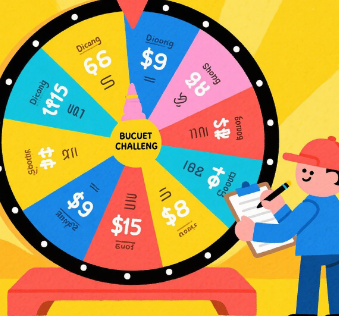Budgeting often feels like a chore: dry spreadsheets, discipline, constant self‑control. But what if managing your money could feel like a thrilling spin of Fortune? Enter wheel games for budgeting challenges—a gamified, low‑effort, high‑impact method to turn financial monotony into engaging action.
Why gamification helps tame budgeting pain
Most of us know the pressure: overspending, missed savings, money stress. Gamified tools alleviate that burden. For instance, a study on Mint users integrating self‑determination theory and technology acceptance model found that gamified features enhanced users’ sense of competence and autonomy, which increased usage and improved budgeting habits . Another research shows gamified finance apps boosted savings among younger users by 30% and engagement by 45% . Add to that industry praise: the Federal Reserve’s Boston branch observed that gamified financial tools reduce stress, build confidence, and encourage real-world saving behavior .

Common frustrations wheel games can solve
Users hauntingly search phrases like “how to stick to spending limit,” “boredom of budgeting,” “making savings fun.” These reflect real pain points:
- Boredom kills budgets. Manual bill tracking is tedious.
- Lack of variation. Repetitive routines lead to rapid abandonment.
- Accountability gaps. Without a push, saving goals slip.
By addressing these, wheel-based challenges breathe life back into budgeting.
How wheel games for budgeting challenges work
- Create a thematic wheel. Slice a wheel into categories: “no takeout,” “move $50 to savings,” “garage sale prep,” etc.
- Spin weekly or monthly. The random element provides surprise, breaks monotony.
- Track results. Celebrate wins—fold the wheel narrative into your planning routine.
- Share socially. A group or family challenge adds stakes and fun.
Real‑world implementations exist: Ursuline Academy’s “Wheel of Reality” teaches students how unexpected events affect personal finances—even job loss or windfalls—by spinning a wheel to simulate life changes
Hard data from education and finance
- The “Wheel of Life” approach used in classrooms improves real‑world budgeting skills, emphasizing unpredictability like emergencies .
- The Budget Challenge®, a 10‑week simulation for teens, shows that gamified lessons with feedback increase financial capability more than traditional teaching
- Academic reviews caution that gamification must be carefully designed—leaderboards or badges can backfire without meaningful content .
Thus, wheel games must contain educational value and built‑in explanation, not just flashy spins.
Best practices—make your wheel game actually work
- Focus on small, varied challenges: One “no‑coffee day” spin can beat overwhelming savings goals.
- Explain the why: Choose prompts that align with budgeting goals and include brief reminders (e.g. “saving $20 this spin = 2% of monthly grocery budget”).
- Include feedback loops: Log results, adjust future spins.
- Social accountability: Compete or compare results with peers to boost motivation.
- Beware over‑gaming: Avoid obsession with points. Keep the game playful, not compulsive
The payoff—why you should try wheel-based budgeting now
- Boosts engagement: 45% more app usage, 30% more savings in studies
- Reduces boredom and stress: Games reduce emotional fatigue in money-management .
- Teaches resilience: Simulating life’s unpredictability prepares users for real incomes and expenses .
- Promotes autonomy: Users feel in control and empowered by choosing wheel content .
Ready to spin your way to better budgeting?
When you’re tired of dry spreadsheets and rigid budgets, wheel games for budgeting challenges inject creativity, surprises, and real motivation. And the best part? You can start today.
Explore smart, fun and flexible wheel‑based budgeting at spinthewheel, where financial planning becomes a spin away from habit-change.
About the designer
Lydia Chen is a behavioral finance designer with over eight years of experience blending psychology, game mechanics, and education. She holds an M.Sc. in Behavioral Economics and has helped launch award-winning fintech tools that merge playful interaction with real-world outcomes.
spinthewheel empowers you to embrace creativity in finance, turning routines into rewarding spin‑worthy adventures—one budget challenge at a time.